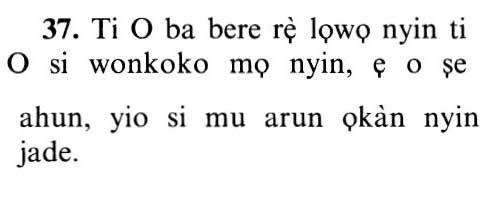47vs37
Select any filter and click on Go! to see results
إِن يَسْأَلْكُمُوهَا فَيُحْفِكُمْ تَبْخَلُوا وَيُخْرِجْ أَضْغَانَكُمْ
In yasalkumooha fayuhfikum tabkhaloo wayukhrij adghanakum
Index Terms
Click to play
Yoruba Translation

Hausa Translation
Dã Allah zai tambaye ku su (dũkiyõyin) har Ya wajabta muku bãyarwa, zã ku yi rõwa kuma Ya fitar da miyãgun ƙulle-ƙullenku.
Asbabu n-Nuzuul (Occasions of Revelation)
Allah then says,
إِن يَسْأَلْكُمُوهَا فَيُحْفِكُمْ تَبْخَلُوا ...
If He would demand of you all of it and urge you, you would withhold.
meaning, if He pressures you much, you would become stingy.
... وَيُخْرِجْ أَضْغَانَكُمْ ﴿٣٧﴾
And He will expose your (secret) ill-wills.
Qatadah said,
"Allah knows that extracting wealth (i.e., money from people) brings about ill-wills.''
Indeed, Qatadah has said the truth, because money is dear to the people, and they do not spend it except in things that are dearer to them than it.
" إن يسألكموها فيحفكم تبخلوا " أي يحرجكم تبخلوا " ويخرج أضغانكم " قال قتادة : قد علم الله تعالى أن في إخراج الأموال إخراج الأضغان وصدق قتادة فإن المال محبوب ولا يصرف إلا فيما هو أحب إلى الشخص منه .
"إن يسألكموها فيحفكم" يبالغ في طلبها "تبخلوا ويخرج" البخل "أضغانكم" لدين الإسلام
يلح عليكم , يقال : أحفى بالمسألة وألحف وألح بمعنى واحد . والحفي المستقصي في السؤال , وكذلك الإحفاء الاستقصاء في الكلام والمنازعة . ومنه أحفى شاربه أي استقصى في أخذه .
I'raab - grammatical analysis of the Qur'an
«إِنْ» شرطية جازمة.
«يَسْئَلْكُمُوها» مضارع مجزوم لأنه فعل الشرط والفاعل مستتر والكاف مفعول به أول وها مفعول به ثان والجملة ابتدائية.
«فَيُحْفِكُمْ» الفاء حرف عطف ومضارع معطوف على يسألكموها.
«تَبْخَلُوا» مضارع مجزوم لأنه جواب الشرط والواو فاعله والجملة جواب الشرط لا محل لها.
«وَيُخْرِجْ» معطوف على تبخلوا.
«أَضْغانَكُمْ» مفعول به.
